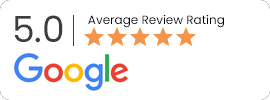When developing robust web applications, one framework shines bright i.e., Django. But what exactly makes Django web development stand out amidst the competition? Its clean design, rich feature set, and thriving community form the bedrock of its success.
Django isn’t just another framework; it’s a cornerstone of modern web development. Moreover, Its prominence in the web development ecosystem is not merely anecdotal; compelling statistics back it:
- Django powers a significant portion of the Pythor Web Framework. It holds a whopping 32.54% market share.
- According to the Django Developers Survey 2022, 66% of developers prefer Django for both personal and office work as well as educational and side projects.
- Furthermore, tech giants such as Instagram, Pinterest, and Dropbox are some of the companies that use Django. Thus, further solidifying its reputation for scalability and reliability.
Django web development has revolutionized how developers craft dynamic and scalable web applications. These stats show why it has become a go-to framework for developers looking to build powerful web applications.
In this blog post, we’ll delve into the world of Django, exploring its core concepts, benefits, and best practices. Moreover, we will also dive into essential tips for building high-quality web app with Django.
Understanding Django Web Development
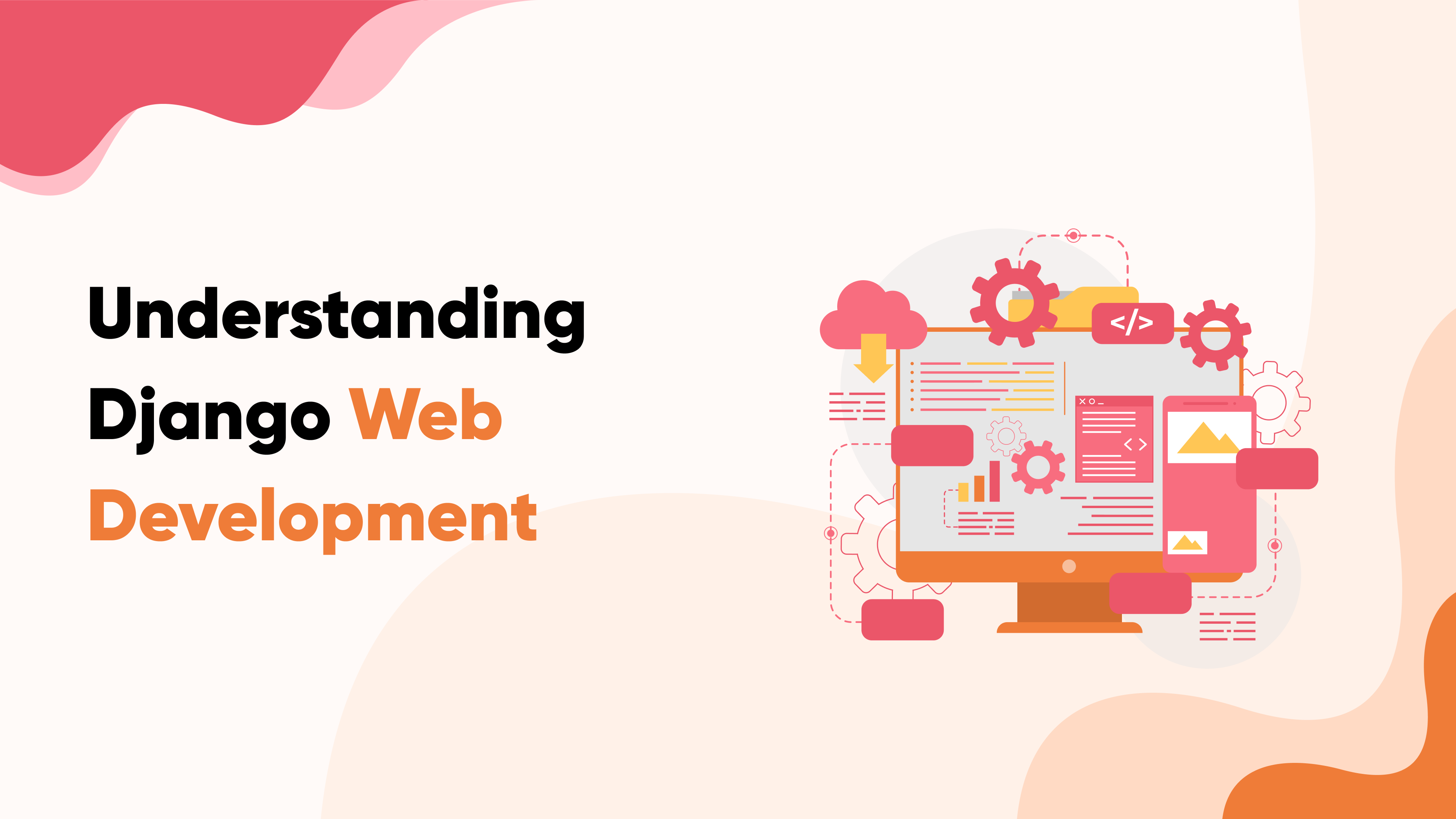
Understanding Django Web Development: Unveiling the Power of Python Frameworks
Django is a handy toolkit that makes building websites with Python easier and faster. Imagine Django as a toolbox where developers can find everything they need to construct a website efficiently. In short, it provides pre-built components and tools, saving developers time and effort.
With Django, developers don’t have to start from scratch. They can use ready-made solutions for common tasks. Thus, this makes website development smoother and more manageable.
Django web development follows the Model-View-Template (MVT) pattern, which divides the website’s structure into three main components:
- Models
- Views, and
- Templates.
Further, this approach ensures that Django web development projects remain organized and manageable.
In simple terms, models handle the data, views control what users see and interact with, and templates determine how the website looks.
Overall, Django web development empowers developers to create dynamic and scalable websites with ease. With its robust features and efficient workflow, Django has become a cornerstone of modern web development practices.
What Are the Benefits of Django Web Development
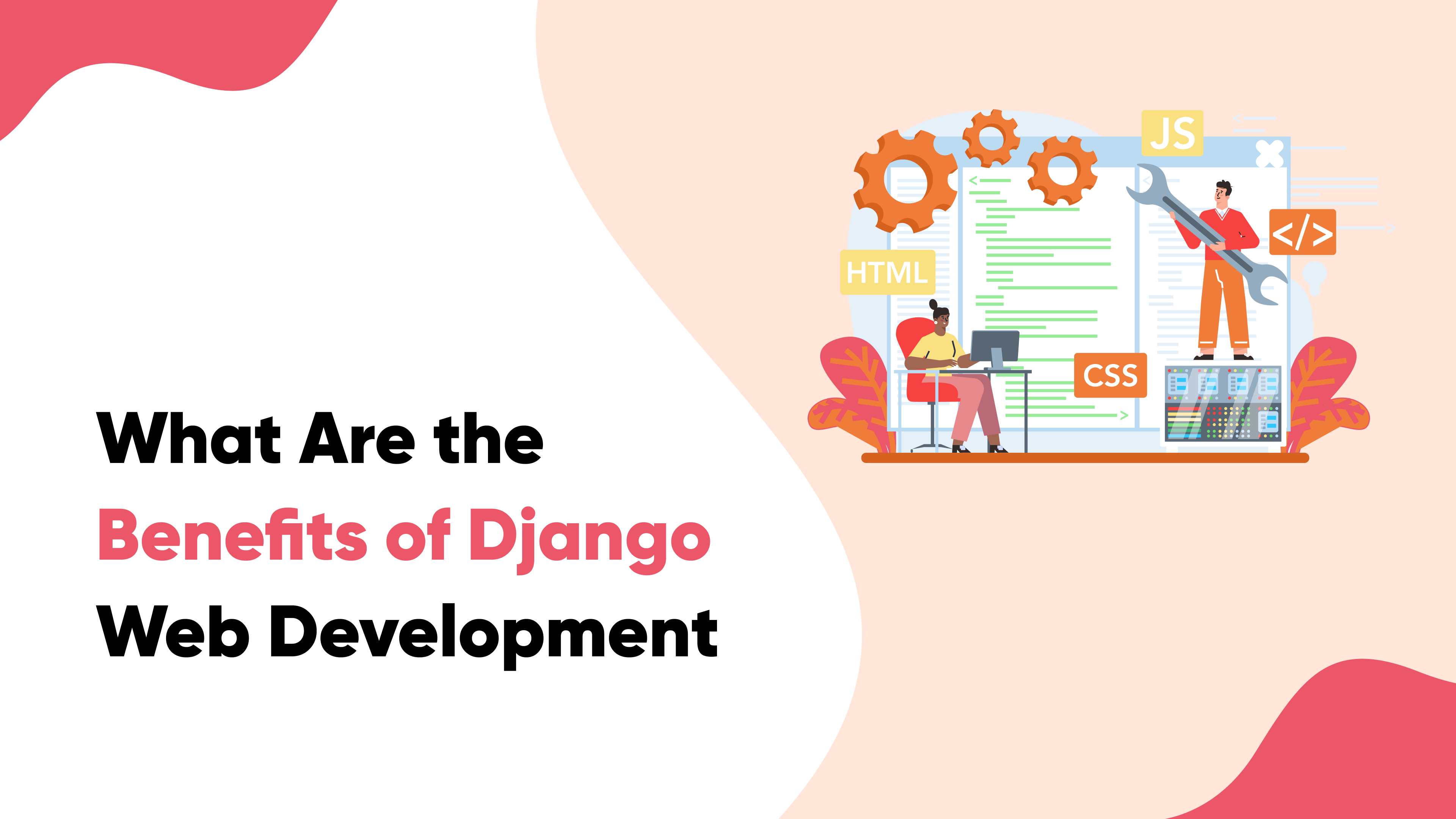
Benefits of Django Web Development: Unlocking Efficiency and Reliability
Django web development offers several advantages that make it a top choice for building websites. Let’s look at them in detail:
-
Rapid Development
Django web development speeds up the process of creating web applications. Its pre-built features and established conventions allow developers to get projects off the ground quickly. Thus, it helps in saving valuable time and effort.
Django developers can focus more on building unique features and less on repetitive tasks like setting up databases or handling user authentication. Additionally, while hiring developers it is important to look for the set of skills to ensure the expected results are gained.
-
Scalability
Django’s scalability ensures that web applications can grow alongside their user base. Whether a project starts small and expands over time or begins with high traffic from the outset, Django can handle the load without sacrificing performance.
As a result, developers can confidently build applications, knowing they won’t outgrow the framework as their projects evolve.
-
Security
Today, cybersecurity is as vital as having a roof over your head. Thankfully, security is paramount in Django web development. Django comes equipped with built-in security features that protect against common threats.
These include SQL injection, cross-site scripting (XSS), cross-site request forgery (CSRF), and clickjacking. With Django, developers can focus on building features, knowing that their applications are shielded from many common vulnerabilities by default.
-
Versatility
Django’s versatility makes it suitable for a wide range of projects. Whether developers are building a simple blog, an e-commerce platform, or a complex enterprise-level application, Django can accommodate their needs.
As a result, developers rely on Django for projects of any size or complexity without having to learn new frameworks for each new endeavor.
What are the Best Practices in Django Web Development
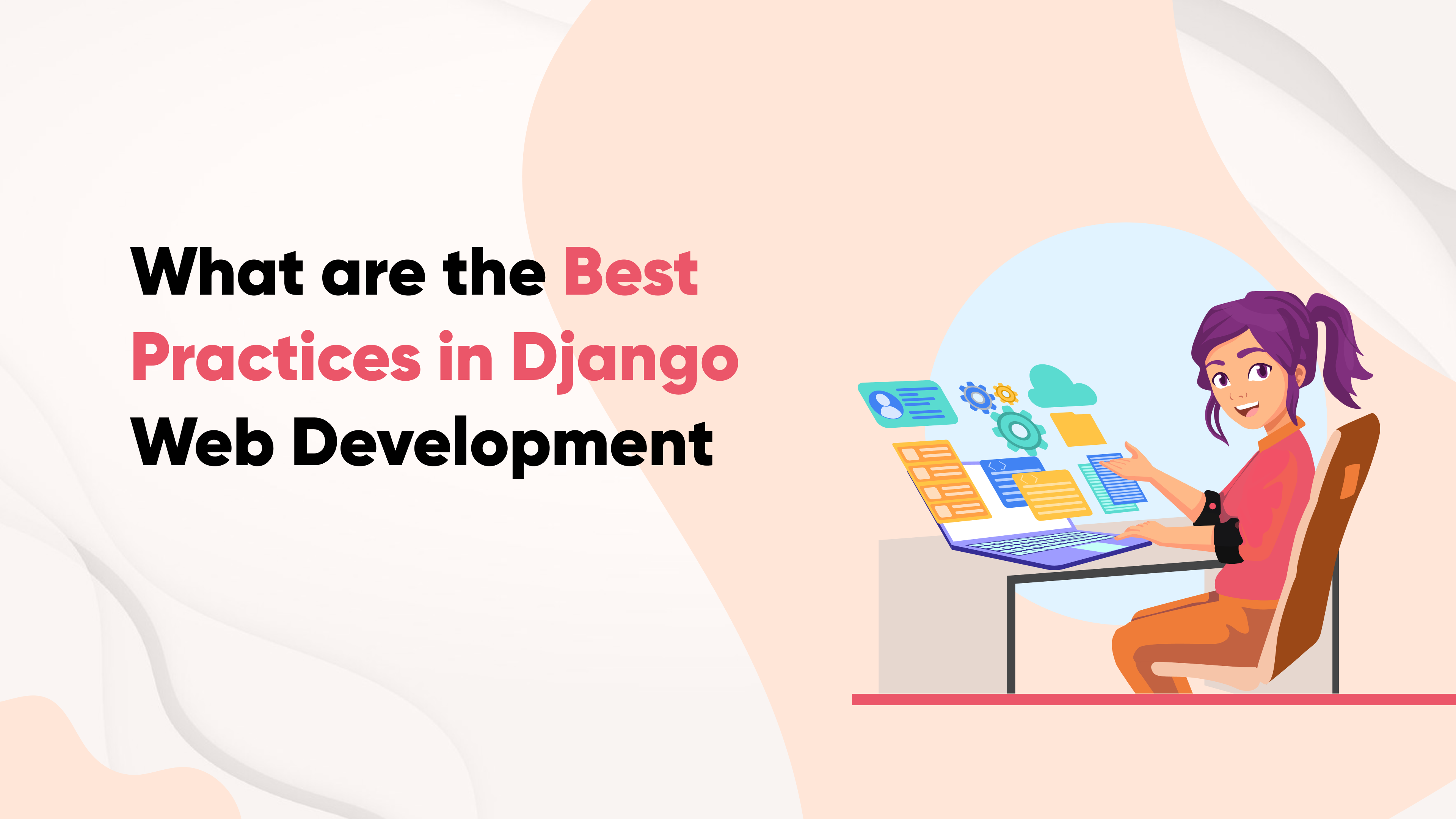
Best Practices in Django Web Development: Building Websites the Right Way
Mastering the best practices in Django web development ensures smooth sailing when creating robust and efficient web applications. Here are some Django best practices:
-
Structure Your Project Effectively
Organizing your Django Web Development project is crucial for maintainability and scalability. Follow the recommended project structure, dividing your application into reusable components like apps, templates, and static files.
Moreover, utilize Django’s built-in features such as apps, models, views, and templates to maintain a clear separation of concerns.
-
Follow DRY (Don’t Repeat Yourself) Principle
Before diving into Django Web Development, it’s essential to grasp Django’s core principles, such as DRY (Don’t Repeat Yourself) and the “batteries-included” philosophy. Understanding these principles will guide your development process and help you utilize Django’s features effectively.
For instance, Avoid code duplication by organizing reusable components. Furthermore, implement inheritance, and utilize Django’s template inheritance feature to keep your codebase clean and maintainable.
-
Optimize Database Queries
Efficient database queries are crucial for the performance of your web application. Leverage Django’s ORM (Object-Relational Mapping) to write clean and efficient database queries.
Use query set methods such as select_related() to perform efficient table joins and retrieve related objects in a single query. Similarly, use prefetch_related() to fetch related objects in separate queries and reduce the number of database round-trips.
-
Monitor and Debug Your Application:
Continuous monitoring and debugging are essential for identifying and resolving issues in your web application. Integrate Django web development projects with logging and monitoring tools like Sentry or ELK stack to track errors and performance metrics.
Moreover, leverage Django’s debugging tools, such as Django Debug Toolbar, to analyze and debug requests in development mode.
-
Building Your Django Dream Team
Bringing onboard a dedicated team skilled in Django software brings many perks. These experts understand Django inside-out, ensuring your project makes the most of the framework’s strengths.
Further, they will organize your project smartly, follow best practices, and use Django web development features efficiently. Additionally, with a dedicated team, you’ll have ongoing support and maintenance to keep your Django applications running smoothly.
Additionally, with the facility to go ahead with remote hiring through a top IT staffing company, you gain access to global talent.
Unlocking the Potential of Django Web Development: Practical Tips
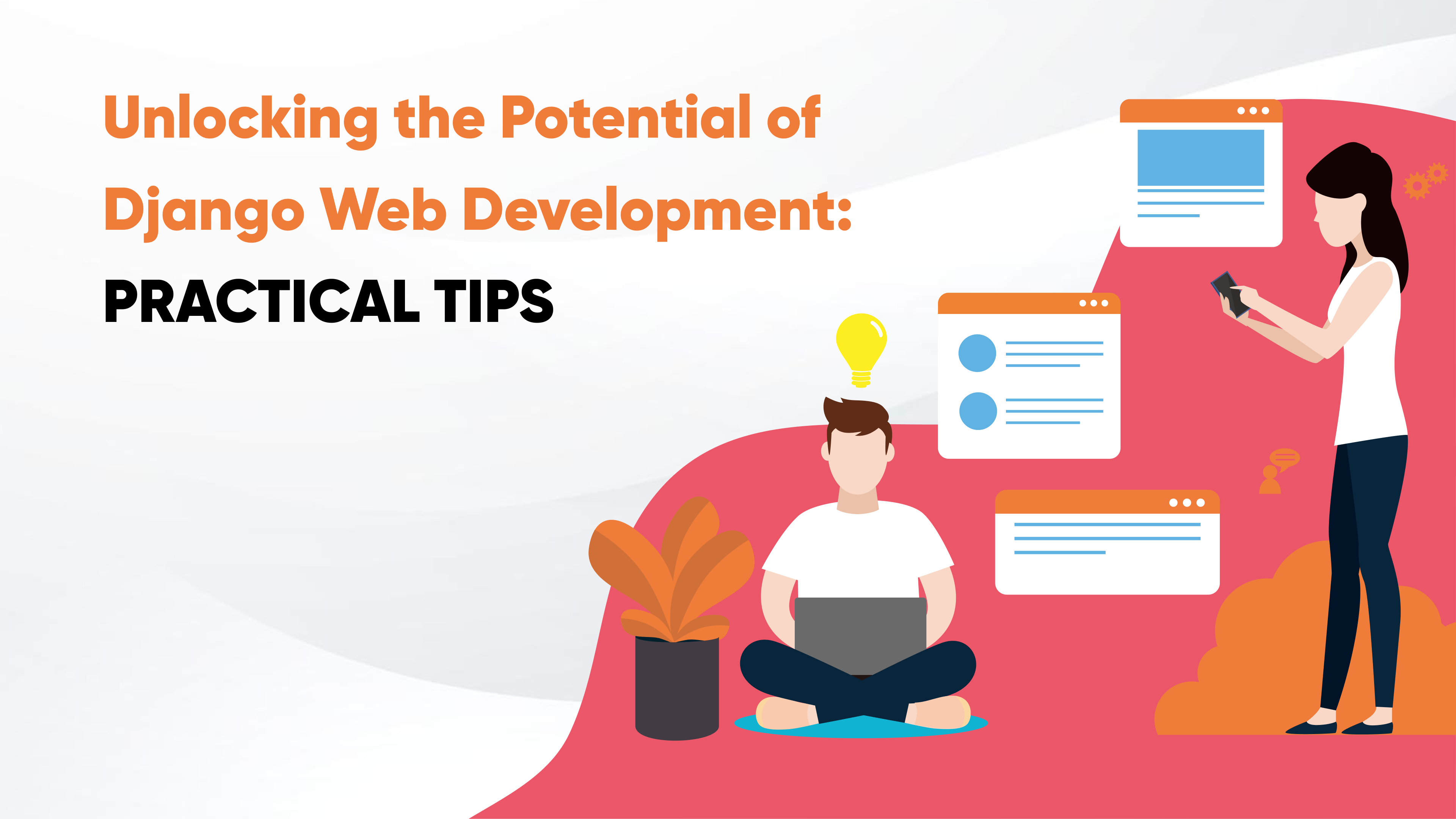
Unlocking the Power of Django: Practical Tips for Web Development
Partnering with hiring experts like Insnapsys for Django web development needs will offer you access to professionals who excel in crafting secure, scalable, and versatile web applications. With a deep knowledge of technologies like MySQL, Unix/Linux, PHP, Java, and C, a comprehensive approach to development is assured.
Some of the primary tips that can help you gain efficient results include:
- Ensure proper Django web development project documentation to facilitate collaboration and maintenance.
- Regularly update the Django web application framework and its dependencies to leverage new features and security patches.
- To improve application performance, implement caching mechanisms using Django’s built-in cache framework or third-party solutions.
- Use Django’s middleware to implement custom logic such as authentication, request/response processing, and error handling.
- Take advantage of Django’s testing framework to write your application’s comprehensive unit and integration tests.
Conclusion
Django web development provides developers with a powerful toolkit for building reliable and scalable web applications. By embracing Django’s core principles and leveraging its features, developers can ensure the successful development and maintenance of top-notch web applications.
Additionally, following best practices and implementing essential tips further enhance the process. Whether you’re a seasoned pro or just starting out, Django’s approach guides you to create outstanding
FAQs
How to use Django for web development?
You make websites with Django by writing Python code that Django understands. It’s like giving instructions to Django on what your website should do and how it should look.
Is Django good for web development?
Yes, Django is great for building websites because it provides tools and shortcuts that make the process easier and faster.
Are Django developers in demand?
Yes, many companies are looking for Django developers because it’s a popular framework for making websites.
Is Django web development the most cost-effective option available for application development?
Django web development can be a good option because it’s free and open-source. This means you don’t have to pay for the framework itself. As a result, you can save money.
How do you hire experts for Django web development?
To find and hire Django developers, you can look for them on job websites or work with an IT staffing company that specializes in tech talent.





